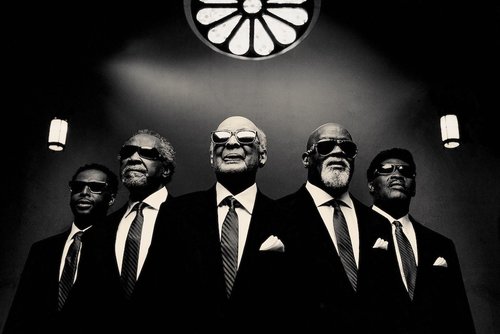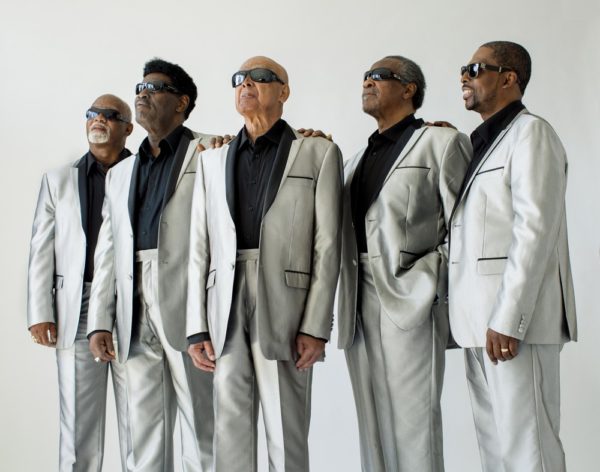
28 Aug Telluride Blues & Brews: Blind Boys of Alabama
Limited tickets to Telluride Blues & Brews remain. Go here to find out more.
Please scroll down to the bottom of the story to listen to my interview with Rickie McKinnie of The Blind Boys of Alabama.

In 1944, the Allies invade Normandy on D-Day (June 6).
FDR is re-elected President, beating Republican challenger Thomas Dewey.
The St. Louis Cardinals take the World Series over the St. Louis Browns, 4-2.
And the Blind Boys of Alabama take it on road, determined to “spiritually uplift audiences.”
Did they achieved their goal?
The answer is a resounding, all-caps, YES.
To recap, over the seven decades (and counting) since the Blind Boys of Alabama first began singing together, America witnessed a World War, a Civil Rights movement, a Summer of Love and Woodstock; the moon landing, Vietnam, and the fall of the Berlin Wall; JFK, MLK, and Malcolm X; the invention of the jukebox, the atomic bomb, and the Internet.
Through it all, the Blind Boys’ music not only endured, the group thrived, helping to define the sound of the American South.
The Blind Boys’ loose definition of gospel music allowed the singers to measure the spiritual dimensions of rock and pop songs, blues, funk and folk and all stops in between. Rather than being a group of singers who borrowed from the decades-old gospel traditions, they are a group who helped define and cement those traditions over two centuries.
Praised by NPR as “pioneers,” the Blind Boys managed to transcend barriers of race and genre to become one of the most acclaimed and celebrated groups in modern music.
From the Alabama Institute for the Negro Blind, where the original members met as children, they traveled all the way to The White House, where they performed for three different presidents, including Presidents Clinton (1994), President Bush (2002) and President Obama (2010), who invited the group to the White House, along with Bob Dylan, Joan Baez, John Mellencamp, Smokey Robinson, Natalie Cole and other iconic songsters, for “In Performance at the White House: A Celebration of Music from the Civil Rights Movement.”
Despite a rotating cast of members, over time the group released more than 50 gospel-soul albums and worked with artists ranging from Tom Petty to Bonnie Raittt – the headliner at Telluride Blues & Brews 2017 – Peter Gabriel and Al Green.
Their list of accolades and achievements keeps piling up too.
Thanks in part to appearances on The Tonight Show, Late Night with David Letterman, the Grammy® Awards telecast, 60 Minutes, and on their own holiday PBS Specials, millions have come to enjoy Blind Boys performances.
And their live shows are renowned: roof-raising musical happenings that appeal to audiences of all cultures on every continent.
Next stop Telluride.
The Blind Boys of Alabama return to town after two years to perform once again at the nearly sold-out 24th annual Telluride Blues & Brews Festival, September 15-17, 2017. The group is featured in a power-packed line-up that includes Bonnie Raitt, Steve Winwood, TajMo, Anders Osborne, Drive-By Truckers, and Benjamin Booker.
The band’s story is, in many ways, America’s story, and that story is at the heart of their emotional new album, Almost Home.
Recorded over four different sessions helmed by four different Grammy-winning producers in four different cities, Almost Home recounts the band’s remarkable journey, primarily through original songs written for them by an outstanding collection of artists including Valerie June, the North Mississippi Allstars, Phil Cook, John Leventhal, Marc Cohn, and Ruthie Foster among others.
The record is the band’s first in three years, following on the heels of 2014’s Talkin’ Christmas! with Taj Mahal and their 2013 collaboration with Bon Iver’s Justin Vernon, I’ll Find A Way. sees
The new release see the Blind Boys picking up right where they left off, blending the sacred and secular, the traditional and innovative, the past and present.
Almost Home grew out of the recognition that the band’s original lineup is down to just two remaining survivors: long-time group leader Clarence Fountain and current leader Jimmy Carter. Both men were born in Alabama during the Great Depression, and while Carter is still active and regularly touring with the group, Fountain’s health precludes him from traveling much these days, though he does appear on the album.
“These men were both raised as blind, African American males in the Deep South during the Jim Crow years, and they were sent to a school where the expectation for them was to one day make brooms or mops for a living,” says Blind Boys manager Charles Driebe. “But they’ve transcended all that. The arc of their lives and of the band reflects the arc of a lot of changes in American society, and we wanted to find a way to capture their experiences in songs.”
Given the age of the surviving original members, it’s not hard to hear the subtext of the album. In lines like “my work is done and I’m finally going home to see my maker,” they acknowledge they are closer to the end than the beginning. But rather than resting on their laurels, the Blind Boys are adding a new chapter to their legacy, creating some of the finest work of their career as they solidify their place not just in musical history, but in the very fabric of American culture.
The original members may be Almost Home, but it’s clear the Blind Boys intend to keep on singing, spreading peace, joy, and love until the very last high note.
Learn more by listening to a podcast featuring Blind Boys regular, Ricky McKinnie:
More about The Blind Boys of Alabama:

The Blind Boys of Alabama met at the Alabama Institute for the Negro Blind in 1939.
To put that date in perspective, the get-together predates the attack on Pearl Harbor and the development of the 12-inch vinyl album (only ‘78s’ were available at the time). When they began singing together, “separate but equal” was still a sad summary of race relations in the United States.
Touring throughout the South during the Jim Crow era of the 1940s and 1950s— when blacks were denied the use of whites-only water fountains, bathrooms, and restaurants— the Blind Boys persevered, even flourished thanks to their unique sound, which blended the close harmonies of early jubilee gospel with the more fervent improvisations of hard gospel.
Hailed as “gospel titans” by Rolling Stone, the Blind Boys rose to fame in the segregated south with their thrilling vocal harmonies and roof-raising live show. The group released its debut single, “I Can See Everybody’s Mother But Mine,” on the iconic Veejay label in 1948, launching a 70+-year recording career that would see them rack up five Grammys (plus one for Lifetime Achievement), enter the Gospel Music Hall of Fame, collaborate with everyone from Mavis Staples and Stevie Wonder to Prince and Lou Reed, and perform on the world’s most prestigious stages.
It would be difficult to overstate the Blind Boys’ influence on their contemporaries and the generations that came after.
The New York Times said they “came to epitomize what is known as jubilee singing, a livelier breed of gospel music,” adding that “they made it zestier still by adding jazz and blues idioms and turning up the volume, creating a sound…like the rock ‘n’ roll that grew out of it.”
Time Magazine raved that “they’re always hunting for – and finding – the perfect note or harmony that lifts an old tune into the sublime,” while The Washington Post praised their “soul-stirring harmonies” and “range of cross-genre collaborations,” and The New Yorker simply called them “legendary.”
“When the Blind Boys started out, we weren’t even thinking about all these accolades and all that stuff,” founding member Jimmy Carter told NPR. “We just wanted to get out and sing gospel and tell the world about gospel music.”
Mission accomplished.
About 75 years after they hit their first notes together, the Blind Boys of Alabama remain exceptional, not just for the longevity of the group, but also for the depth and breadth of their catalog and relevance to contemporary roots music.


Sorry, the comment form is closed at this time.